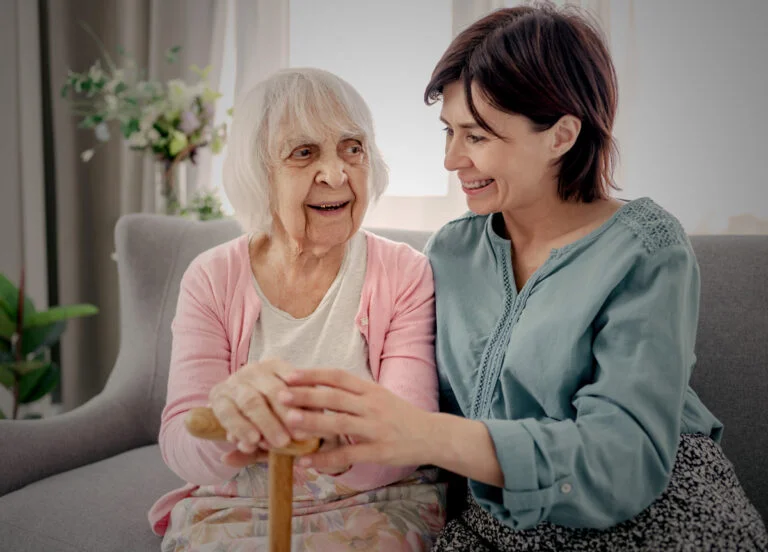Accepting the reality that your loved one has a terminal illness can be devastating. Fear, anger, grief, and anxiety are all common and perfectly understandable emotions to be feeling at this difficult time.
Though it may feel easier to avoid conversations around the end of life, it’s important to discuss your loved one’s wishes for their final days. Knowing when and how to start these conversations, including when to call hospice, can be challenging.
Hospice care provides a supportive environment to ensure that your loved one’s last few months, weeks, or days are lived in comfort and dignity. Here, we discuss what to expect from hospice care, how to begin discussions about your loved one’s wishes for their care at the end of life, and the signs it might be time to call hospice.
Are you or a loved one living with a chronic or terminal illness?
The Sage Family of Companies is here to help.
Are you or a loved one living with achronic or terminal illness?
The Sage Family of Companies is here to help.
What Is Hospice Care?
Hospice care is a specialized form of healthcare that focuses on the comfort and quality of life of an individual with a terminal illness who is nearing their final days. A patient can enter hospice care when their body is no longer responding to treatments or if they choose to stop treatment.
Generally, hospice is appropriate when a doctor believes an individual has six months or less to live if the illness takes its natural course. When someone starts hospice care, treatments meant to cure their disease are stopped. Their care plan then becomes focused on easing their pain and other symptoms.
Your loved one can enter hospice care at home or in a healthcare facility, such as a nursing home or hospital.
When Should You Call Hospice? 8 Signs Your Loved One May Be Ready
Determining when it’s time for hospice can be an extremely difficult decision. Accepting that the end of life is approaching is a lot to process and will undoubtedly bring up numerous emotions for the whole family.
Remember, hospice care aims to ensure your loved one’s comfort. They’ll receive care to ease their pain and give them the best quality of life possible as they prepare to transition out of life. Additionally, hospice care incorporates mental, emotional, and spiritual support for the patient and their family.
If you think it may be time to start hospice care or you’re having a tough time knowing if it’s the right move for your loved one, consider these eight signs that mean it might be time to make the call.
1. Treatment is No Longer Working
If your loved one is no longer responding to curative treatments and their condition continues to deteriorate, hospice care can provide comfort and support to help them cope with the end-stages of the disease.
Your loved one may also decide they no longer wish to stay on certain treatments. They might decide this if the side effects from medications are taking too great a toll and decreasing their quality of life. End-of-life care can help ease them through this transition and prepare them for what’s to come.
2. Symptoms are Getting More Difficult to Manage
Another reason to call hospice care for cancer, dementia, or other conditions is if your loved one’s symptoms or medication side effects are becoming too difficult to manage at home. Research shows pain increases in the last four months of life, and your loved one may need additional help finding relief.
Hospice providers, including doctors, nurses, and home health aides can provide support through regular home visits or around-the-clock care at a facility to help ease your loved one’s pain and other symptoms.

3. They Often Get Confused and Less Able to Communicate
When an illness has progressed to a serious stage, your loved one may get confused, agitated, and uncomfortable. Pain and other symptoms may become too much to bear, and they may become withdrawn or have difficulty communicating.
Repeated episodes of confusion or your loved one not remembering where they are or finding the right words to express themselves may also be signs of dementia and that they need additional care.
4. They’re Visiting the Doctor or ER More Often
If your loved one is visiting the doctor or emergency room more often, it’s likely a sign that their health is declining and their disease is getting more difficult to manage. This, combined with other factors such as increased pain or confusion, may mean it’s time to start hospice care.
5. They’re Unable to Complete Routine Tasks on Their Own
If your loved one has become so ill they can no longer do daily tasks such as bathing, grooming, or getting dressed, it may be another sign that it’s time to call hospice.
6. They Don’t Have an Appetite
Monitor your loved one’s eating habits and look for appetite changes or unexplained weight loss. Not wanting to eat, difficulty swallowing, or losing weight without trying may be signs that they’re not digesting their food properly and that the body is slowing down. This, combined with other signs on this list, may signal an illness is getting closer to its end stages.
7. They Have Recurring Infections
Your loved one may seriously ill, battling recurring infections like pneumonia, urinary tract infections, or sepsis. This may be a sign their immune system is weakening and their illness is progressing. These infections may get more frequent when approaching end of life.
8. You’re Feeling Overwhelmed or Burnt Out From Caregiving
Caregiving for a loved one with a chronic illness can be physically, mentally, and emotionally taxing. Of course you want to be there to care for your loved one, but if you’re feeling overwhelmed or burnt out, it’s certainly ok to ask for help. Hospice care provides support and resources for the whole family, including caregiving support.
Are you or a loved one living with a chronic or terminal illness?
The Sage Family of Companies is here to help.
Are you or a loved one living with achronic or terminal illness?
The Sage Family of Companies is here to help.
What Hospice Care Can Do for Your Loved One
Hospice care will provide your loved one with comprehensive care to address their physical, mental, emotional, and spiritual needs during the difficult time at the end of life.
When it’s time to call hospice for dementia, kidney failure, or other illnesses, a team of hospice workers will work together to enhance your loved one’s comfort and quality of life.
This team may include:
- Doctors
- Nurses
- Home health aides
- Social workers
- Counselors
- Spiritual or faith leaders
- Volunteers.
A hospice care team can provide these services:
- Medication to ease pain and manage symptoms
- Assistance with routine care like bathing, dressing, and eating
- Home visits by the hospice physician, nurse, medical social worker, and home health aide
- Counseling to help cope with the difficult emotions that come up when nearing end of life
- Medical equipment, including wheelchairs or walkers and medical supplies like bandages and catheters
- Physical and occupational therapy
- Speech-language pathology services
- Dietary counseling
- Spiritual guidance from chaplains, priests, or other spiritual advisers if desired
- Short-term inpatient care when adequate pain and symptom management can’t be achieved at home
Family members are also included in hospice care plans and many resources are available to them, as well, including:
- Caregiving support
- Respite care (temporary relief from caregiving to avoid or address caregiver burnout)
- Bereavement counseling
- Access to support groups
How to Start the Hospice Conversation With a Loved One
Talking to a loved one about their wishes for the end of life is typically not an easy discussion. You may not want to cause them further distress or you may have difficulty accepting their prognosis yourself.
However, silence will do no one any good in this situation, and it’s important to consider your loved one’s wishes for future care. When it’s time to call hospice, open and honest conversations about the reality of what’s happening can also lead to a deeper emotional connection and quality bonding through this difficult time.
If you’re having trouble bringing up hospice to a loved one, consider the following advice:
- Choose an appropriate setting in a quiet, private place.
- Ask for permission to talk about their health and their future care.
- Be patient and empathetic and let them set the pace of the conversation.
- Ask questions about their wishes if treatment should stop working, how they’d want to spend their time if they knew the end of life was approaching, and if they’ve selected someone to make healthcare decisions if they can no longer make them.
- Listen carefully to what your loved one is saying. Let them know you understand and respect their thoughts and concerns, even if you disagree.
- Take notes after the conversation so you have a written record of their wishes.
- Try again at a later time if the conversation was too difficult and affirm that you are there to support them.
Hospice Care vs Palliative Care
Palliative care and hospice care are not the same. Both palliative and hospice care focus on comfort and quality of life for those with chronic illnesses. However, with palliative care, treatments intended to cure or stop the disease continue. With hospice care, these treatments are stopped.
Some people ask if starting hospice care means giving up. It’s important to remember that hospice provides a way for people to live in comfort, peace, and dignity without curative care when treatment options for their disease are no longer working.
Hospice doesn’t mean giving up but rather is a means to improve the quality of life of your loved one and their family members when the end of life is approaching.
Common Illnesses Treated in Hospice Care
Any terminal illness can be treated with hospice care. Some of the most common diseases treated in hospice include:
- Cancer
- Alzheimer’s disease
- Dementia
- Heart Disease
- Amyotrophic Lateral Sclerosis (ALS)
- Lung disease
- Kidney disease
- Chronic Obstructive Pulmonary Disease (COPD)
Frequently Asked Questions
Here are answers to some of the most frequently asked questions about when to call hospice.
How Do You Know When to Call Hospice?
If your loved one has a terminal illness and has stopped responding to treatments, it may be time to consider hospice. Typically, hospice care is recommended when a doctor believes an individual has six months or less to live if the disease takes its natural course.
Treatments that are no longer working, symptoms that are too difficult to manage, more frequent infections and/or trips to the ER, loss of appetite, and confusion or inability to communicate are all signs that it might be time to call hospice.
What Signs Would You Notice If the End of Life is Near?
The human body undergoes several changes when the end of life is near. Lack of appetite, withdrawing from others, sleeping more, and increased pain are all signs that death may be approaching in the coming weeks or months.
When the end of life is close, an individual usually experiences changes in blood pressure, body temperature, and heart rate. Irregular breathing and mottled skin that’s purple or blue in color are also signs the end of life is nearing.
Key Takeaway
When your loved one has a terminal illness, everything can feel overwhelming and too heavy to bear. Hospice care can provide comfort for your loved one in their final days and help ease the burden on the whole family.
The Sage Family of Companies is here to answer any questions you may have.





